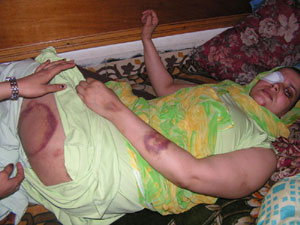
“Someone must stop these terrible violations of human rights against my people.” This summer the Sahrawi student Elkouria Amidane visited Norway. She came to tell her side of the story about what is happening in the occupied territory of Western Sahara. Through demonstrations and protests against Moroccan authorities, and her fight for the freedom of a people, she has endured both torture and persecution.
Raftohuset.no
26 July 2007
By Øystein Skotheim
Elkouria Amidane bears a heavy load. In June, her brother was sentenced to 5 years in prison. Just a week earlier, her sister was arrested, and beaten during interrogation. Due to her wish and venture for the right of self-determination for her people, Amidane has been subjected to torture and discrimination. Once she was even expelled from school of the same reason.
Her closest family has been exposed to violence from the Moroccan police. Her home has been raided 15-20 times the last two years without any warrant.
As the previous king of Morocco put it: “Human rights cease to exist at the borders of Western Sahara.” Morocco has occupied the territory for 32 years.

Beaten to the ground
Amidane is one of many Sahrawi students who have protested against the treatment Moroccan authorities are giving the population of Western Sahara. They are demanding the right to self-determination in their own country and a final end to the attrocities committed against them on a daily basis.
"The peaceful student demonstrations are usually met with violence and deportation", says Amidane, who herself has lost two years of school; simply because she critizised the Monarch in class.
"Sahrawi students are beaten to the ground, interrogated, tortured, and sentenced to long terms in prison. Moroccan law courts rule the protestors as criminals", she explains.
Despite the students' response of hunger strikes and further demonstrations, the authorities do not seem interested in compromise. In other words, Western Sahara remains Moroccan.
Forced to sign papers
The latest of noticable demonstrations erupted in May this year. Together with her compatriots, Amidane participated in a sit-in at her university in Marrakesh, Morocco. Soon enough the police was informed about the situation at the university campus, and in great numbers they decided to entrap the protesting students.
By surrounding them and blocking every exit, the entrapment was a success. As night fell an offensive was launched. Without any warning tear gas was directed against the Sahrawis. In the rupture that ventured, they attempted to escape. Only a few managed to get away. Tenfolds were intercepted. After the confrontation at the university square, several wounded were left lying on the ground grumbling in pain. The authorities had shown them no mercy.
Amidane was battered. Her best friend, Sultana, was inflicted injury on her one eye, while another of her friends belly had been cut with the blade of a knife. Sultana was bleeding heavily and the need to get to a hospital was urgent. The ambulance was summoned, and the girls assumed they would be safe once onboard. The reality turned out to falsify that assumption. Inside the ambulance there was no medical care awaiting them. The only treatment they received was additional illtreatment. The women were sexually abused. This continued later as well, in the interrogation room and in a police car. Sultana's injuries proved the most serious. She lost total sight on her wounded eye.

"As Sultana was sick in bed, she was forced to sign some papers. She had no idea what these papers said", she says.
"Now we realize that they were declarations. Declarations stating that the police are not responsible for the injuries brought upon her. The responsibility was instead accounted Sahrawi students", Amidane despairs.
In June Sultana was sentenced to 8 months in prison. She has for long been recovering at a hospital waiting to gain enough strength to do her time.
Also her own family has experienced oppression. In April, her brother, El Ouali, was put behind bars for a 5-year sentence. Despite his trial was a judicial parody he also lost his appeal.
Her older sister, Aminatu, was arrested outside the family's home in July.
"We had no idea where they were taking her", says Amidane.
The family spent 15 hours looking around at police stations without any luck. A day later Aminatu, bruised by the police, was released. She had been interrogated and questioned on her work for human rights.
New negotiations
32 years have passed since Moroccan troops invaded and occupied the Western Saharan territory. The monarch at that time, Hassan 2, had but one goal: to strengthen his position as the nation's leader in a time of political instability. The king succeeded in satisfying his own followers. The Sahrawis were dismayed.
In 1991 the Western Saharan liberation organization, POLISARIO, and the Moroccan government agreed on a deal. The plan was for the Sahrawis to arrange a referendum to decide on the future fate of the occupied territory. The referendum was meant to take place in 1992. Due to Moroccan denial, it still has not been held.
This year new negotiations have been initiated. POLISARIO has already shown a tremendous will to compromise on the issue. They even welcome Morroccans living in Western Sahara, to take part in the planned referendum. Still the Moroccan government is not satisfied with the Sahrawi proposal. Western Sahara, they claim, is Moroccan Sahara.
Amidane still has hope. The Sahrawi impatience is, however, not indefinite. Together with POLISARIO, their struggle has mostly non-violent. Some might claim that this exactly is the reason why the media have no interest in this hidden conflict. The lack of massive confrontations simply does not appeal to market interests. In the meanwhile, the Sahrawis thirst for a determined and united international community.
"I hope more can be done for our people. The international community must react and act towards Morocco, and demand a cessation of the attrocities. We demand peace and freedom from Morocco, now. Things simply cannot go on like this", she says.
Order our Western Sahara poster!
“Try to Visit Western Sahara”…
The Security Council fails Western Sahara and international law
On 31 October 2025, a new resolution was adopted in the UN Security Council calling on the Saharawis to negotiate a solution that would entail their incorporation into the occupying power, Morocco.
Saharawis Demonstrate Against Trump Proposal
The United States has proposed in a meeting of the UN Security Council on Thursday that the occupied Western Sahara be incorporated into Morocco.
Skretting Turkey misled about sustainability
Dutch-Norwegian fish feed giant admits using conflict fishmeal from occupied Western Sahara. Last month, it removed a fake sustainability claim from its website.



